被动语态精讲课件
图片预览
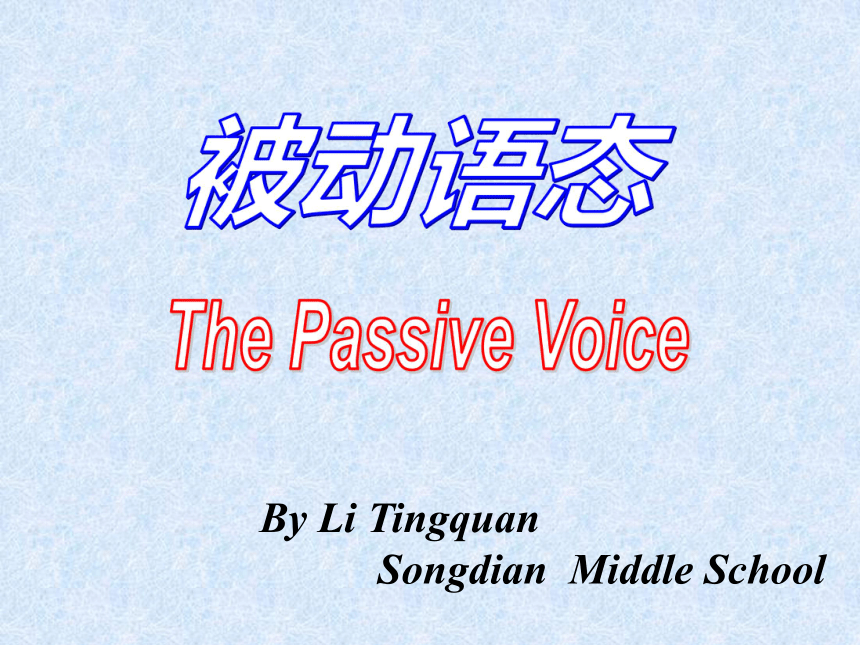
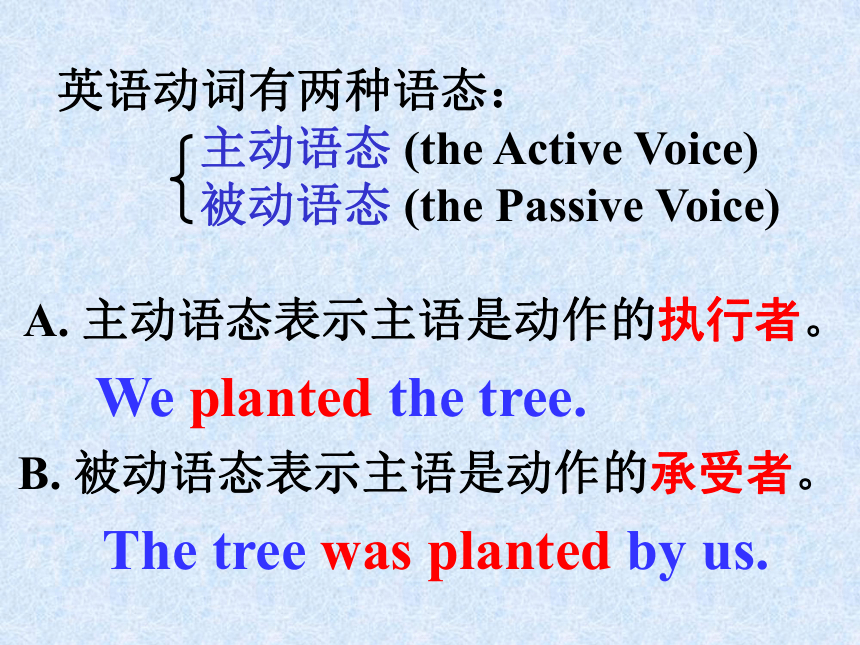
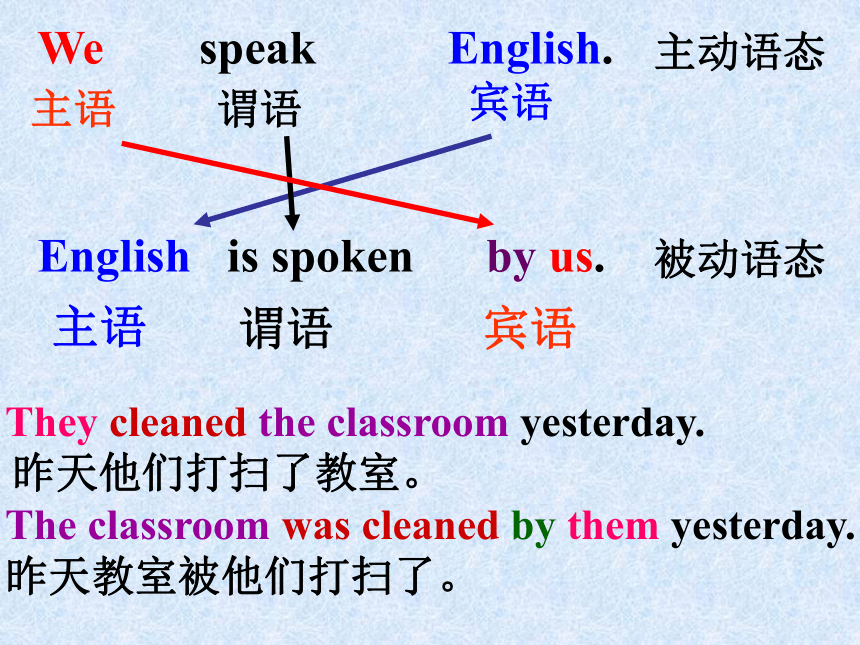
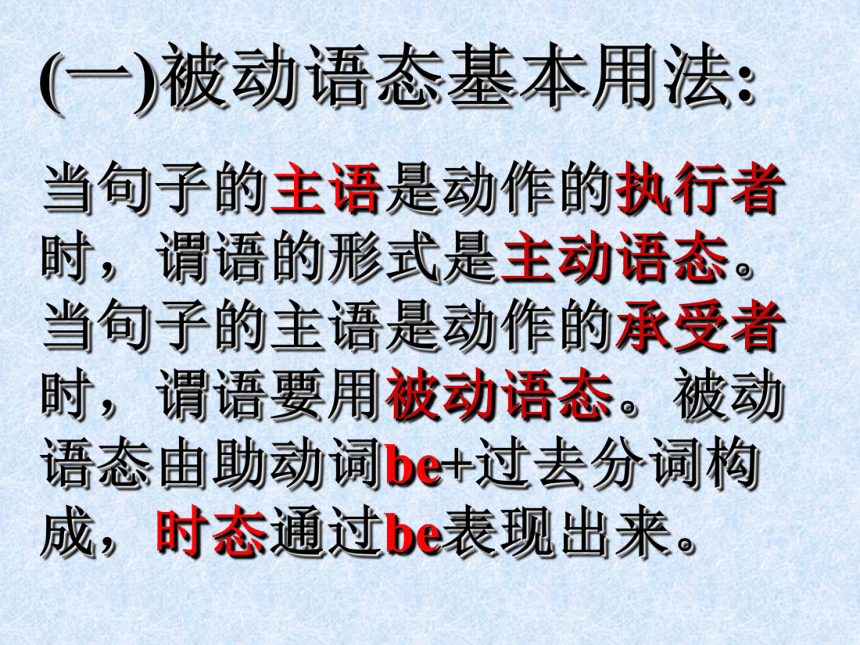
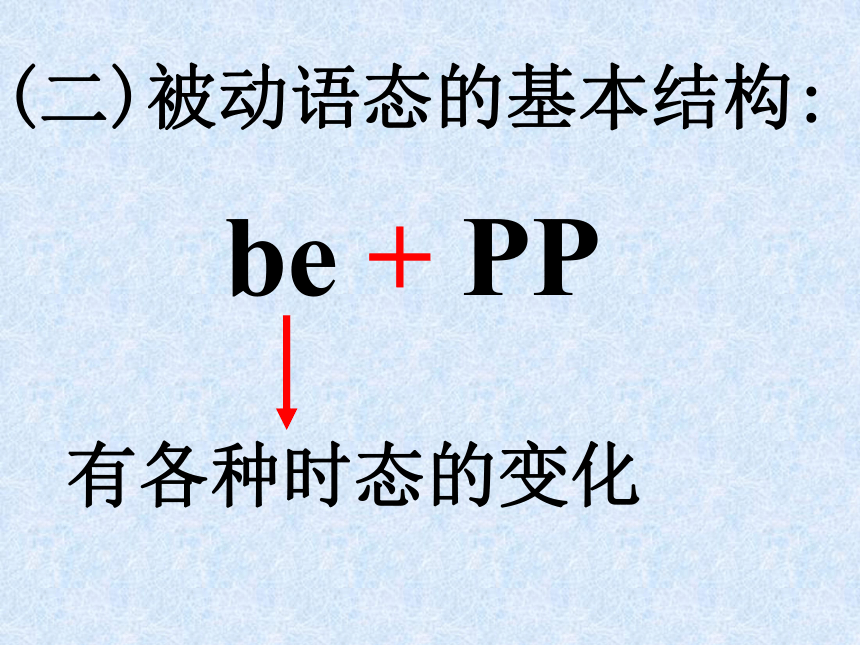
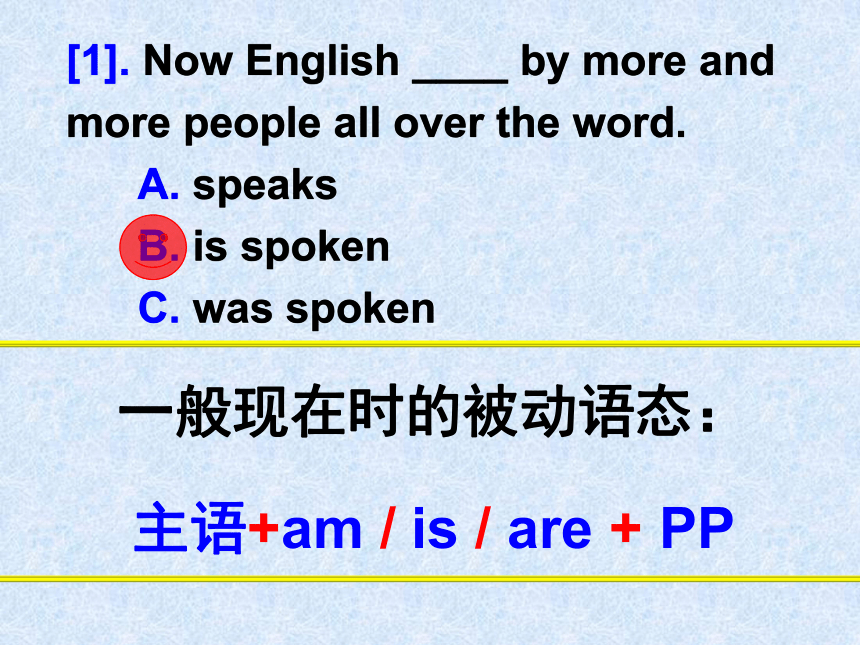
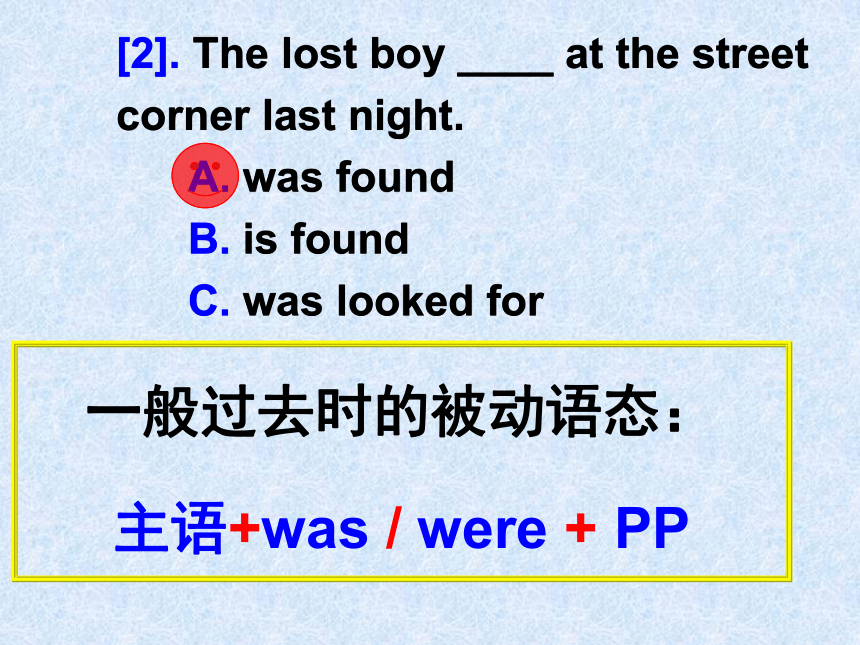
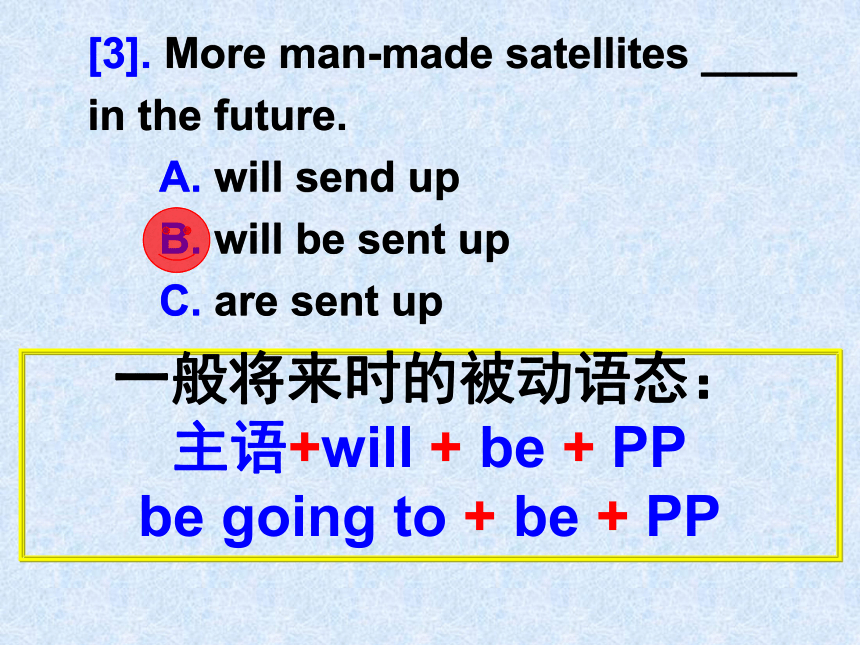
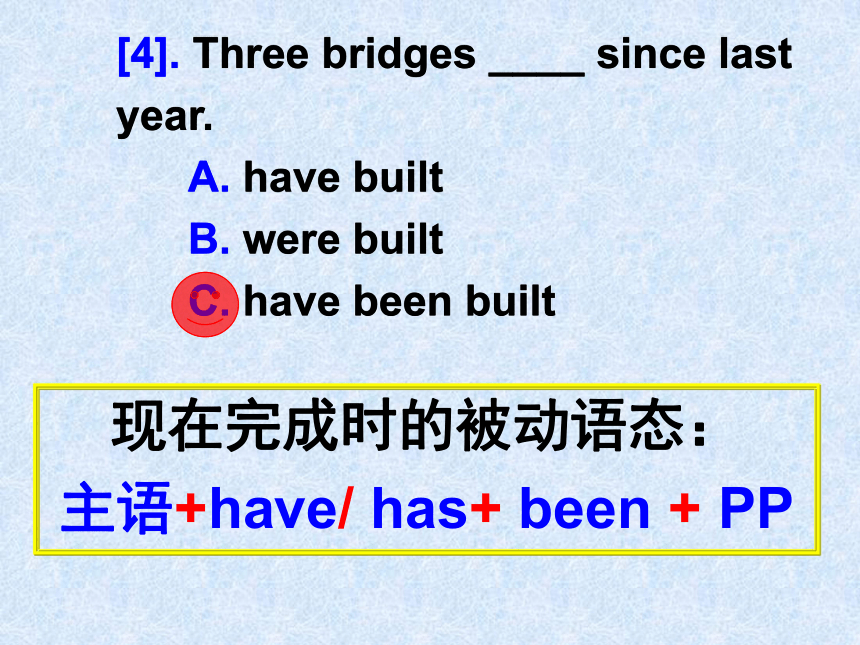
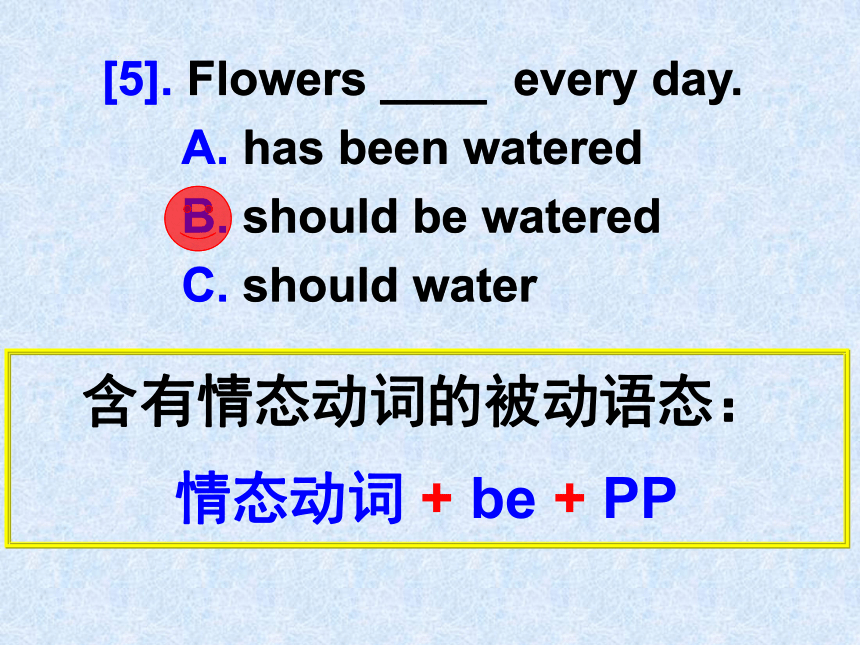
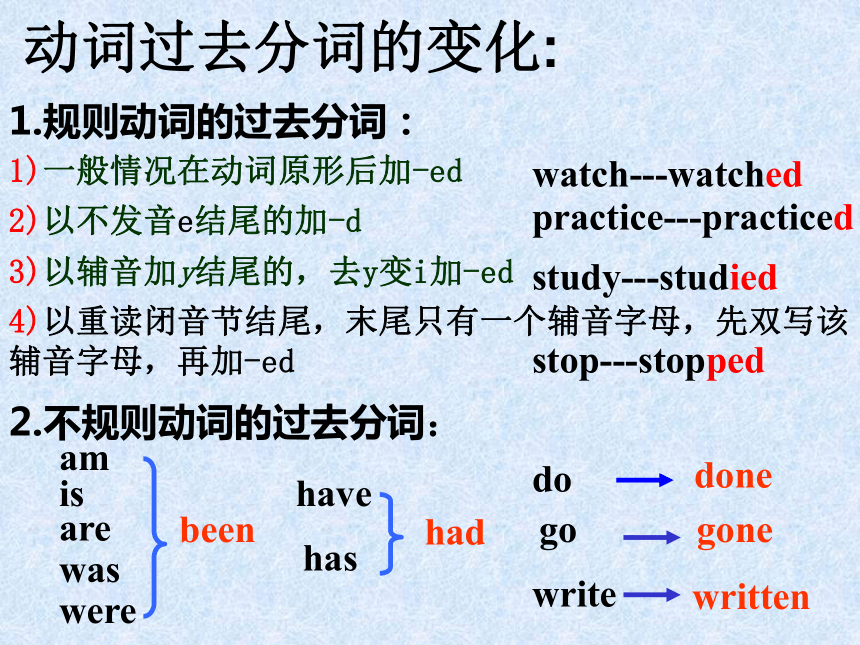
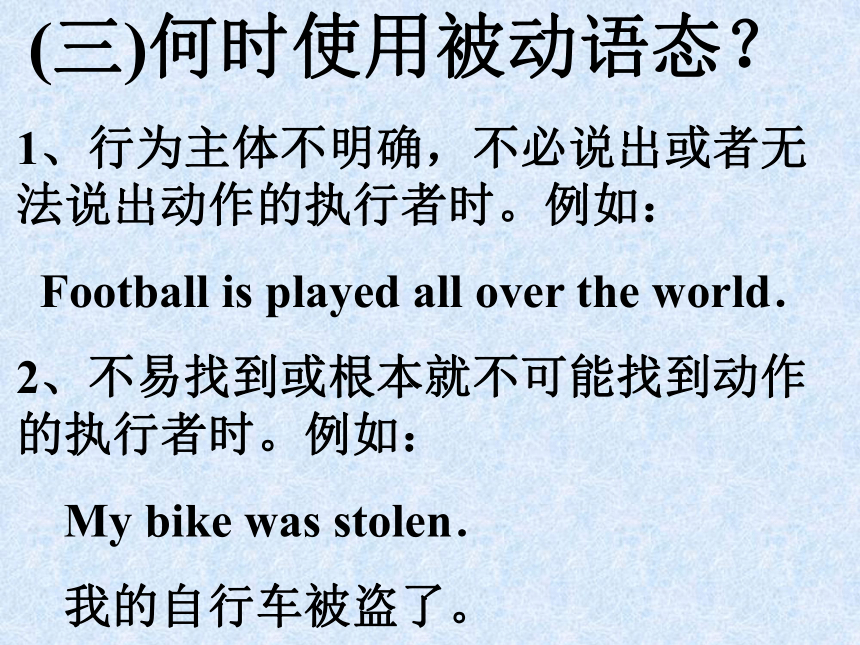
文档简介
(共41张PPT)
By Li Tingquan
Songdian Middle School
英语动词有两种语态:
主动语态 (the Active Voice)
被动语态 (the Passive Voice)
A. 主动语态表示主语是动作的执行者。
B. 被动语态表示主语是动作的承受者。
We planted the tree.
The tree was planted by us.
We speak English.
主语
谓语
宾语
English is spoken by us.
主语
谓语
宾语
主动语态
被动语态
They cleaned the classroom yesterday. 昨天他们打扫了教室。
The classroom was cleaned by them yesterday.
昨天教室被他们打扫了。
(一)被动语态基本用法:
当句子的主语是动作的执行者时,谓语的形式是主动语态。当句子的主语是动作的承受者时,谓语要用被动语态。被动语态由助动词be+过去分词构成,时态通过be表现出来。
be + PP
(二)被动语态的基本结构:
有各种时态的变化
[1]. Now English ____ by more and more people all over the word.
A. speaks
B. is spoken
C. was spoken
一般现在时的被动语态:
主语+am / is / are + PP
[2]. The lost boy ____ at the street corner last night.
A. was found
B. is found
C. was looked for
一般过去时的被动语态:
主语+was / were + PP
[3]. More man-made satellites ____ in the future.
A. will send up
B. will be sent up
C. are sent up
一般将来时的被动语态:
主语+will + be + PP
be going to + be + PP
[4]. Three bridges ____ since last year.
A. have built
B. were built
C. have been built
现在完成时的被动语态:
主语+have/ has+ been + PP
[5]. Flowers ____ every day.
A. has been watered
B. should be watered
C. should water
含有情态动词的被动语态:
情态动词 + be + PP
1.规则动词的过去分词:
1)一般情况在动词原形后加-ed
watch---watched
2)以不发音e结尾的加-d
practice---practiced
3)以辅音加y结尾的,去y变i加-ed
study---studied
4)以重读闭音节结尾,末尾只有一个辅音字母,先双写该辅音字母,再加-ed
stop---stopped
2.不规则动词的过去分词:
am
is
are
was
were
been
have
has
had
do
done
write
written
go
gone
动词过去分词的变化:
(三)何时使用被动语态?
1、行为主体不明确,不必说出或者无法说出动作的执行者时。例如:
Football is played all over the world.
2、不易找到或根本就不可能找到动作的执行者时。例如:
My bike was stolen.
我的自行车被盗了。
3、某些句子习惯上用被动语态。例如:
He was born in October,1989.
4、汉语中含有“被”、“由”等词时。例如:
Tina是被Paul叫来的。 Tina is asked to come by Paul.
5、汉语中含有“据说”、“据悉”、“据报道”等时。例如:
It is said that one day he climbed to the top of a house and ……
It was reported that her mother died of SARS.
众所周知… It is well known that …
据推测说… … It is supposed that …
(四)主动语态变被动语态:
(1)把原来的宾语提到前面作被动语态的主语;
(2)把谓语动词变成被动结构(be+过去分词) (根据被动语态句子里的主语的人称和数,以及原来主动语态句子中动词的时态来决定be的形式)。
(3)把主动语态中的主语放在介词by之后作宾语,将主格改为宾格。如:
They make the bikes in the factory.
The bikes
in the factory.
are made
them
by
主变被步骤:
1.找宾语: 即动作的承受者(改为主语)
He washed his car yesterday.
His car
3. 判断新主语的单复数:确定be动词的单复数.
be
4. 判断动词的时态 : 即be动词的时态.
2. 修改谓语的语态:即be+原V.过去分词
washed
5. 修改原句的主语 :即by +主语(变宾格).
(by them)
yesterday.
is
was
was
1.Tom broke the window.
The window
2.She broke the windows.
The windows
3.He cleans the classroom everyday.
The classroom
was broken
by Tom.
were broken
by her.
is cleaned
by him
be动词的单复数变化:
everyday.
He rides the motorbike to work every day.
The motorbike
is ridden
to work
(by him)
every day.
A computer
computer, use, in our class
is used
in our class
every day.
They bought ten computers last year.
Ten computers
last year.
were bought
(by them)
bank, rob, yesterday
was robbed
The bank
yesterday.
1. They will finish the work in ten days.
The work
in ten days.
will be finished
(by them)
2.They are going to have a show
tomorrow.
A show
is going to be had
(by them)
tomorrow.
1. Amy can take good care of the cat .
The cat
can be taken good care of
by Amy.
2. They should sing some beautiful songs.
Some beautiful songs
by them.
should be sung
He can carry the basket easily.
The basket can be easily carried by him.
在通常情况下,修饰被动语态的副词一定要放在助动词be与过去分词之间。如:
She was badly paid. 她挣的钱很少。
The trip was well organized. 旅行组织得很好。
将副词放在过去分词之后也是可以的。
(四)被动语态的特殊情况:
1.在主动语态中,make, let, hear, see, watch, notice等词,其后跟省略to的动词不定式(动词原形),在变为被动语态时,必须还原动词不定式符号to.如:
1) We heard him sing this song in the room.
He was heard to sing this song in the room.
2) The boss made him work 14 hours a day.
He was made to work 14 hours a day.
3) I see him walk to school.
He is seen to walk to school.
2.含有双宾语的动词在变为被动语态时,有以下三种情形:
(1)有些双宾动词(如award, buy, give, leave, lend, offer, pay, show, teach, tell等)在变为被动语态时,既可把间接宾语(指人)变为被动语态的主语,而把直接宾语(指事物)保留下来(称为保留宾语),也可把直接宾语(指事物)变为被动语态的主语,而把间接宾语改为介词to 或for引起的状语(到底用to还是for,与所搭配的动词有关)。比较:
He gave her some money. 他给她一些钱。
She was given
Some money was given to her.
some money.
2. He bought his friend some fruits yesterday.
His friend was bought some fruits (by him) yesterday.
Some fruits were bought for his friend (by him) yesterday.
1. He bought her a watch.
A watch was bought for her (by him).
She was bought a watch (by him).
(2)有些双宾动词(如bring, do, make, pass, sell, send, sing, write等)通常用直接宾语(指事物)作被动语态的主语,而将间接宾语用作保留宾语(其前根据情况用介词to或for):
Father made me a doll.
A doll was made for me.
He wrote her a letter.
A letter was written to her.
(3)有些双宾动词(如answer, deny, envy, refuse, save, spare等)通常用间接宾语(指人)作被动语态的主语,而将直接宾语用作保留宾语:
He answered me that question.
I was answered that question by him.
表示主语的属性特征的动词+副词well/ badly/easily/smoothly,用主动式表被动义
3.作“需要”讲的need的被动形式:
need to be done 或 need doing
Your jacket needs to be washed/washing.
4.表示“开始、结束、运动”的动词用主动式表被动义。 begin, open, start, stop, end, finish, shut, run,...)
The shop opens at 6 am. every day.
A traffic accident _________(happen) just now.
happened
2. 连系动词(Link.v.) 如:be, look, seem, feel, sound, smell, taste, get, turn, become…
Peking Opera ________ (sound) beautiful.
sounds
3. 当此动词表示事物的自然属性的时候:
The pen _________ (write) very fast.
writes
This kind of sweater _______ (sell) well.
sells
1. 不及物动词(vi.) 如:happen, take place, appear, disappear, …
不用被动语态的动词:
(表示主语的自然属性特征) + 副词 (well/ badly/easily/smoothly),常见动词:
read, write, sell, wash, clean, wear, lock, open, cook, shut, dry, eat, drink, …
The books ____ well.
A. were sold B. sell
C. have sold D. are being sold
This kind of cloth ____ easily.
A. has washed B. was washed
C. washes D. is washed
Practice:
1 Must I pay for it at once
_____ it ____ _____ _____ at once
2 We will build a new lab.
A new lab ____ ____ _____.
3 They aren’t stopping the traffic now.
The traffic ____ ____ _______ now.
4 How long have you kept the book
How long ____ the book ____ ____
Must
been
paid
for
will
be
built
isn’t
been
stopping
has
been
kept
5. If your homework ______(do) well, you may go to play.
6. Mr. Green was seen _______(grow) trees.
7. The blackboard was ________ (look) carefully by the students.
8. The ship model ____ be ____ (make) in two days.
is done
to grow
looked at
will
made
9. I’m sorry,sir.Your recorder isn’t ready yet.It ____ in the factory.
is being repaired
is repaired
has been repaired
hasn’t been repaired
10.In warm weather, fruit and meat ____ long.
cannot be kept
don’t keep
mustn’t keep
is not kept
11. --Did you hand him the letter yesterday
--No, I ____ to him.
A. brought it B. took it
C. had it sent D. carried it
12.Alice had a dress ____ last week.
A.made B. make
C. to be made D. to make
Oral practice-主动句改被动句
.A car knocked him down yesterday.
.Two doctors and ten nurses make up the medical team.
.When I got there, they were cutting up a fallen tree.
He was knocked down by a car yesterday.
The medical team is made up of by two….
A fallen tree was being cut up, when I got
there.
4). We’ll put on the play next Sunday.
5). Workers are building a new teaching building
in our school.
6). They had completed the railway by the end of
last year.
The play will be put on next Sunday.
A new teaching building is being built by workers in our school.
The railway had been completed by the end of last year.
7). We should protect the earth.
8). You need to paint the wall.
The earth should be protected.
The wall needs to be painted.
Quiz 1
1. The steel _____ cold.
A. is felt B. was feeling
C. feels D. is being felt
2. His plan _____ good.
A. has sounded B. is sounding
C. is sounded D. sounds
3.Work _____ at 7 pm. today.
A. ends B. ended
C. was ended D. had ended
4.The pen ______ smoothly.
A. was wrote B. writes
C. has writing D. is written
5.This coat _____ easily.
A. has washed B. was washed
C. washes D. is washed
Correcting mistake
2.Correct the mistake(s) in each sentence if any:
1)Two boys hurt while playing a ball.
2)The singer lived in London until he
was sending to university.
3)How long do you think the meeting
will be lasted
was sent
will last
were hurt
4)Class is begun at 7:30 every day.
5)His plan is sounded good.
6)Your coat needs being washed.
begins
sounds
to be washed / washing
By Li Tingquan
Songdian Middle School
英语动词有两种语态:
主动语态 (the Active Voice)
被动语态 (the Passive Voice)
A. 主动语态表示主语是动作的执行者。
B. 被动语态表示主语是动作的承受者。
We planted the tree.
The tree was planted by us.
We speak English.
主语
谓语
宾语
English is spoken by us.
主语
谓语
宾语
主动语态
被动语态
They cleaned the classroom yesterday. 昨天他们打扫了教室。
The classroom was cleaned by them yesterday.
昨天教室被他们打扫了。
(一)被动语态基本用法:
当句子的主语是动作的执行者时,谓语的形式是主动语态。当句子的主语是动作的承受者时,谓语要用被动语态。被动语态由助动词be+过去分词构成,时态通过be表现出来。
be + PP
(二)被动语态的基本结构:
有各种时态的变化
[1]. Now English ____ by more and more people all over the word.
A. speaks
B. is spoken
C. was spoken
一般现在时的被动语态:
主语+am / is / are + PP
[2]. The lost boy ____ at the street corner last night.
A. was found
B. is found
C. was looked for
一般过去时的被动语态:
主语+was / were + PP
[3]. More man-made satellites ____ in the future.
A. will send up
B. will be sent up
C. are sent up
一般将来时的被动语态:
主语+will + be + PP
be going to + be + PP
[4]. Three bridges ____ since last year.
A. have built
B. were built
C. have been built
现在完成时的被动语态:
主语+have/ has+ been + PP
[5]. Flowers ____ every day.
A. has been watered
B. should be watered
C. should water
含有情态动词的被动语态:
情态动词 + be + PP
1.规则动词的过去分词:
1)一般情况在动词原形后加-ed
watch---watched
2)以不发音e结尾的加-d
practice---practiced
3)以辅音加y结尾的,去y变i加-ed
study---studied
4)以重读闭音节结尾,末尾只有一个辅音字母,先双写该辅音字母,再加-ed
stop---stopped
2.不规则动词的过去分词:
am
is
are
was
were
been
have
has
had
do
done
write
written
go
gone
动词过去分词的变化:
(三)何时使用被动语态?
1、行为主体不明确,不必说出或者无法说出动作的执行者时。例如:
Football is played all over the world.
2、不易找到或根本就不可能找到动作的执行者时。例如:
My bike was stolen.
我的自行车被盗了。
3、某些句子习惯上用被动语态。例如:
He was born in October,1989.
4、汉语中含有“被”、“由”等词时。例如:
Tina是被Paul叫来的。 Tina is asked to come by Paul.
5、汉语中含有“据说”、“据悉”、“据报道”等时。例如:
It is said that one day he climbed to the top of a house and ……
It was reported that her mother died of SARS.
众所周知… It is well known that …
据推测说… … It is supposed that …
(四)主动语态变被动语态:
(1)把原来的宾语提到前面作被动语态的主语;
(2)把谓语动词变成被动结构(be+过去分词) (根据被动语态句子里的主语的人称和数,以及原来主动语态句子中动词的时态来决定be的形式)。
(3)把主动语态中的主语放在介词by之后作宾语,将主格改为宾格。如:
They make the bikes in the factory.
The bikes
in the factory.
are made
them
by
主变被步骤:
1.找宾语: 即动作的承受者(改为主语)
He washed his car yesterday.
His car
3. 判断新主语的单复数:确定be动词的单复数.
be
4. 判断动词的时态 : 即be动词的时态.
2. 修改谓语的语态:即be+原V.过去分词
washed
5. 修改原句的主语 :即by +主语(变宾格).
(by them)
yesterday.
is
was
was
1.Tom broke the window.
The window
2.She broke the windows.
The windows
3.He cleans the classroom everyday.
The classroom
was broken
by Tom.
were broken
by her.
is cleaned
by him
be动词的单复数变化:
everyday.
He rides the motorbike to work every day.
The motorbike
is ridden
to work
(by him)
every day.
A computer
computer, use, in our class
is used
in our class
every day.
They bought ten computers last year.
Ten computers
last year.
were bought
(by them)
bank, rob, yesterday
was robbed
The bank
yesterday.
1. They will finish the work in ten days.
The work
in ten days.
will be finished
(by them)
2.They are going to have a show
tomorrow.
A show
is going to be had
(by them)
tomorrow.
1. Amy can take good care of the cat .
The cat
can be taken good care of
by Amy.
2. They should sing some beautiful songs.
Some beautiful songs
by them.
should be sung
He can carry the basket easily.
The basket can be easily carried by him.
在通常情况下,修饰被动语态的副词一定要放在助动词be与过去分词之间。如:
She was badly paid. 她挣的钱很少。
The trip was well organized. 旅行组织得很好。
将副词放在过去分词之后也是可以的。
(四)被动语态的特殊情况:
1.在主动语态中,make, let, hear, see, watch, notice等词,其后跟省略to的动词不定式(动词原形),在变为被动语态时,必须还原动词不定式符号to.如:
1) We heard him sing this song in the room.
He was heard to sing this song in the room.
2) The boss made him work 14 hours a day.
He was made to work 14 hours a day.
3) I see him walk to school.
He is seen to walk to school.
2.含有双宾语的动词在变为被动语态时,有以下三种情形:
(1)有些双宾动词(如award, buy, give, leave, lend, offer, pay, show, teach, tell等)在变为被动语态时,既可把间接宾语(指人)变为被动语态的主语,而把直接宾语(指事物)保留下来(称为保留宾语),也可把直接宾语(指事物)变为被动语态的主语,而把间接宾语改为介词to 或for引起的状语(到底用to还是for,与所搭配的动词有关)。比较:
He gave her some money. 他给她一些钱。
She was given
Some money was given to her.
some money.
2. He bought his friend some fruits yesterday.
His friend was bought some fruits (by him) yesterday.
Some fruits were bought for his friend (by him) yesterday.
1. He bought her a watch.
A watch was bought for her (by him).
She was bought a watch (by him).
(2)有些双宾动词(如bring, do, make, pass, sell, send, sing, write等)通常用直接宾语(指事物)作被动语态的主语,而将间接宾语用作保留宾语(其前根据情况用介词to或for):
Father made me a doll.
A doll was made for me.
He wrote her a letter.
A letter was written to her.
(3)有些双宾动词(如answer, deny, envy, refuse, save, spare等)通常用间接宾语(指人)作被动语态的主语,而将直接宾语用作保留宾语:
He answered me that question.
I was answered that question by him.
表示主语的属性特征的动词+副词well/ badly/easily/smoothly,用主动式表被动义
3.作“需要”讲的need的被动形式:
need to be done 或 need doing
Your jacket needs to be washed/washing.
4.表示“开始、结束、运动”的动词用主动式表被动义。 begin, open, start, stop, end, finish, shut, run,...)
The shop opens at 6 am. every day.
A traffic accident _________(happen) just now.
happened
2. 连系动词(Link.v.) 如:be, look, seem, feel, sound, smell, taste, get, turn, become…
Peking Opera ________ (sound) beautiful.
sounds
3. 当此动词表示事物的自然属性的时候:
The pen _________ (write) very fast.
writes
This kind of sweater _______ (sell) well.
sells
1. 不及物动词(vi.) 如:happen, take place, appear, disappear, …
不用被动语态的动词:
(表示主语的自然属性特征) + 副词 (well/ badly/easily/smoothly),常见动词:
read, write, sell, wash, clean, wear, lock, open, cook, shut, dry, eat, drink, …
The books ____ well.
A. were sold B. sell
C. have sold D. are being sold
This kind of cloth ____ easily.
A. has washed B. was washed
C. washes D. is washed
Practice:
1 Must I pay for it at once
_____ it ____ _____ _____ at once
2 We will build a new lab.
A new lab ____ ____ _____.
3 They aren’t stopping the traffic now.
The traffic ____ ____ _______ now.
4 How long have you kept the book
How long ____ the book ____ ____
Must
been
paid
for
will
be
built
isn’t
been
stopping
has
been
kept
5. If your homework ______(do) well, you may go to play.
6. Mr. Green was seen _______(grow) trees.
7. The blackboard was ________ (look) carefully by the students.
8. The ship model ____ be ____ (make) in two days.
is done
to grow
looked at
will
made
9. I’m sorry,sir.Your recorder isn’t ready yet.It ____ in the factory.
is being repaired
is repaired
has been repaired
hasn’t been repaired
10.In warm weather, fruit and meat ____ long.
cannot be kept
don’t keep
mustn’t keep
is not kept
11. --Did you hand him the letter yesterday
--No, I ____ to him.
A. brought it B. took it
C. had it sent D. carried it
12.Alice had a dress ____ last week.
A.made B. make
C. to be made D. to make
Oral practice-主动句改被动句
.A car knocked him down yesterday.
.Two doctors and ten nurses make up the medical team.
.When I got there, they were cutting up a fallen tree.
He was knocked down by a car yesterday.
The medical team is made up of by two….
A fallen tree was being cut up, when I got
there.
4). We’ll put on the play next Sunday.
5). Workers are building a new teaching building
in our school.
6). They had completed the railway by the end of
last year.
The play will be put on next Sunday.
A new teaching building is being built by workers in our school.
The railway had been completed by the end of last year.
7). We should protect the earth.
8). You need to paint the wall.
The earth should be protected.
The wall needs to be painted.
Quiz 1
1. The steel _____ cold.
A. is felt B. was feeling
C. feels D. is being felt
2. His plan _____ good.
A. has sounded B. is sounding
C. is sounded D. sounds
3.Work _____ at 7 pm. today.
A. ends B. ended
C. was ended D. had ended
4.The pen ______ smoothly.
A. was wrote B. writes
C. has writing D. is written
5.This coat _____ easily.
A. has washed B. was washed
C. washes D. is washed
Correcting mistake
2.Correct the mistake(s) in each sentence if any:
1)Two boys hurt while playing a ball.
2)The singer lived in London until he
was sending to university.
3)How long do you think the meeting
will be lasted
was sent
will last
were hurt
4)Class is begun at 7:30 every day.
5)His plan is sounded good.
6)Your coat needs being washed.
begins
sounds
to be washed / washing
同课章节目录
- 词法
- 名词
- 动词和动词短语
- 动词语态
- 动词时态
- 助动词和情态动词
- 非谓语动词
- 冠词
- 代词
- 数词和量词
- 形容词副词及其比较等级
- 介词和介词短语
- 连词和感叹词
- 构词法
- 相似、相近词比较
- 句法
- 陈述句
- 一般疑问句和否定疑问句
- 特殊疑问句及选择疑问句
- 反意疑问句
- 存在句(There be句型)
- 宾语从句
- 定语从句
- 状语从句
- 主谓一致问题
- 简单句
- 并列句
- 复合句
- 主谓一致
- 主、表语从句
- 名词性从句
- 直接引语和间接引语
- 虚拟语气
- 感叹句
- 强调句
- 倒装句
- 祈使句
- 句子的成分
- 句子的分类
- 题型专区
- 单项选择部分
- 易错题
- 完形填空
- 阅读理解
- 词汇练习
- 听说训练
- 句型转换
- 补全对话
- 短文改错
- 翻译
- 书面表达
- 任务型阅读
- 语法填空
- 其他资料
